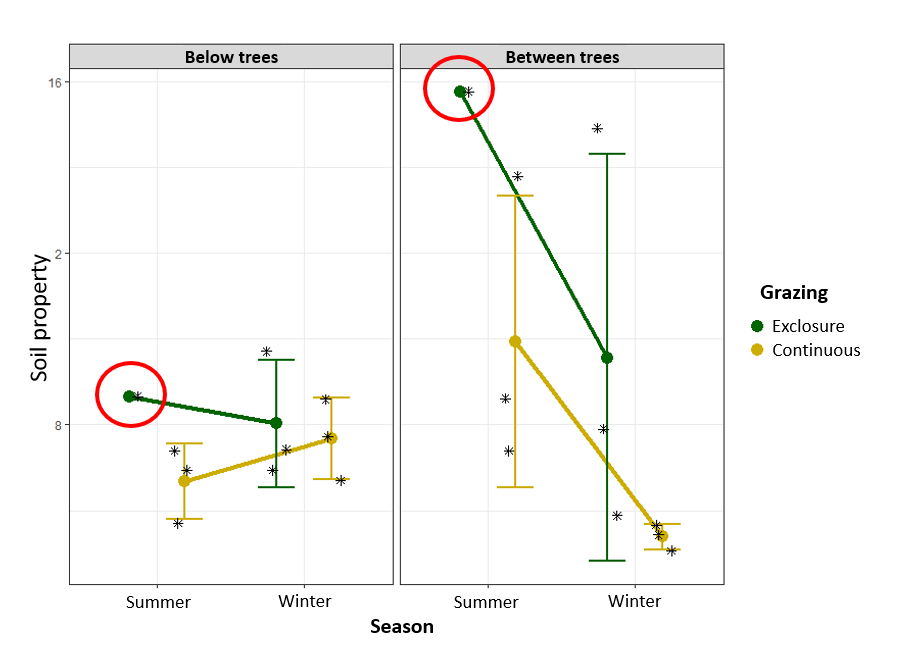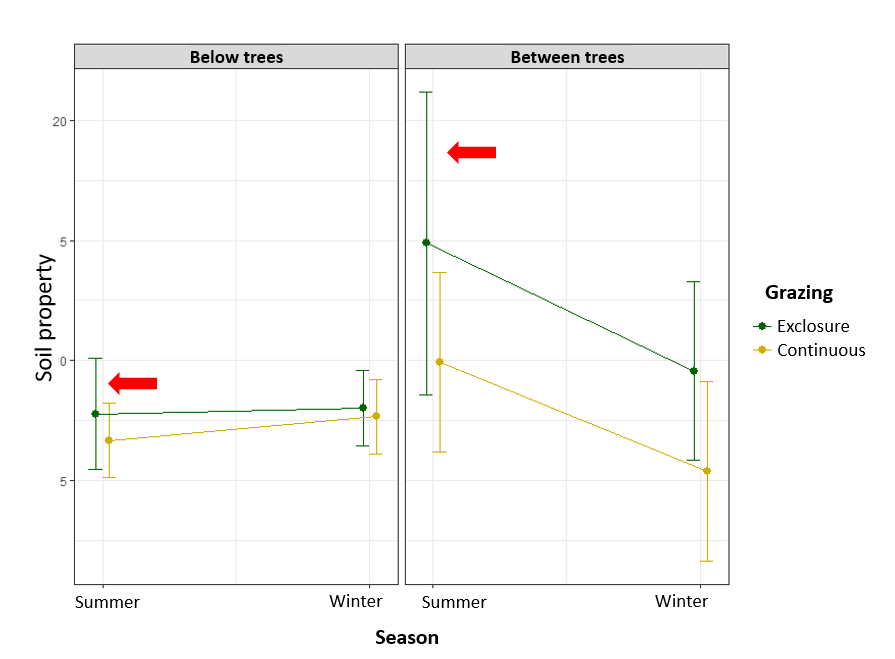I want to know if it is correct to take as valid the results of a mixed model (lme) test for a triple factor experiment with several missing replicates in only one level factor situation.
My objective is to test the effect of grazing exclosure over a soil property in a silvopastoral system (along different seasons and tree cover situations). I am mainly interested in the existence of Exclosure effects; the estimates are secondary for me.
The 3 factors of my proposed experiment are (with 3 replications):
- Grazing (2 levels): Exclosure / continuous (main interest factor)
- Tree_cover (2 levels): Below trees / Between trees
- Season (2 levels): Summer / Winter
The problem is that I've lost some samples during my summer trip, conserving only one replicate (of 3) for Exclosure situation in Summer time.
Season Random_site Tree_cover Grazing soil_property
1 Summer 1 Below trees Contiunuos 7.396
2 Summer 1 Below trees Exclosure NA
3 Summer 1 Between trees Contiunuos 8.612
4 Summer 1 Between trees Exclosure NA
5 Summer 2 Below trees Contiunuos 6.942
6 Summer 2 Below trees Exclosure 8.661
7 Summer 2 Between trees Contiunuos 13.795
8 Summer 2 Between trees Exclosure 15.768
9 Summer 3 Below trees Contiunuos 5.702
10 Summer 3 Below trees Exclosure NA
11 Summer 3 Between trees Contiunuos 7.393
12 Summer 3 Between trees Exclosure NA
13 Winter 1 Below trees Contiunuos 6.702
14 Winter 1 Below trees Exclosure 7.421
15 Winter 1 Between trees Contiunuos 5.058
16 Winter 1 Between trees Exclosure 5.886
17 Winter 2 Below trees Contiunuos 8.596
18 Winter 2 Below trees Exclosure 9.714
19 Winter 2 Between trees Contiunuos 5.657
20 Winter 2 Between trees Exclosure 14.918
21 Winter 3 Below trees Contiunuos 7.722
22 Winter 3 Below trees Exclosure 6.941
23 Winter 3 Between trees Contiunuos 5.436
24 Winter 3 Between trees Exclosure 7.897
 In the figure can clearly be noted the problem (asterisks represents the measurements and missing data situation is rounded in red).
In the figure can clearly be noted the problem (asterisks represents the measurements and missing data situation is rounded in red).
Despite this problem I tried to fit a mixed model (lme) with heteroskedasticity along the "Tree cover" factor (observed in residuals and levene test).
The mixed model (lme) is: response ~ Grazing * Tree_cover * Season
model <- nlme::lme(soil_property ~ Grazing*Tree_cover*Season,
random = ~1|Random_site,
data = df,
na.action = na.omit,
method = "REML")
Anova test gives me a not significant (but very close to be) Grazing:Tree_cover interaction:
car::Anova(model)
Analysis of Deviance Table (Type II tests)
Response: soil_property
Chisq Df Pr(>Chisq)
Grazing 2.6069 1 0.106399
Season 0.2685 1 0.604328
Tree_cover 2.4448 1 0.117914
Grazing:Season 0.3711 1 0.542394
Grazing:Tree_cover 3.7907 1 0.051537 .
Season:Tree_cover 7.9251 1 0.004875 **
Grazing:Season:Tree_cover 0.0000 1 0.995744
---
Signif. codes: 0 ‘***’ 0.001 ‘**’ 0.01 ‘*’ 0.05 ‘.’ 0.1 ‘ ’ 1
But if I run the "post hoc" test, it tells me that there is actually a grazing effect under the "Between trees" situation:
emmeans::emmeans (model, pairwise ~ Grazing | Tree_cover)
Tree_cover = Below trees:
contrast estimate SE df lower.CL upper.CL t.ratio p.value
Exclosure - Continuous 0.722 0.635 10 -0.6928 2.14 1.137 0.2819
Tree_cover = Between trees:
contrast estimate SE df lower.CL upper.CL t.ratio p.value
Exclosure - Continuous 4.565 2.007 10 0.0927 9.04 2.274 0.0462
Results are averaged over the levels of: Season
Degrees-of-freedom method: containment
Confidence level used: 0.95
**NOW THE QUESTION:** Should I disregard this result (because of the several missing data, which seems not to be random but in fact actually is) or could it be considered as valid?
My doubt arose when I saw the graph of the adjusted mixed model (lme), which assigned greater dispersion to the situation where I lost repetitions, giving me the impression that the model considers this problem (as it can be seen in the next figure, red arrows points out the wider error bars under missing data situations).
How does lme package manage this kind of problems? It seems that somehow it considers missing data... I revised Pinhero & Bates (2000) book, but did not found anything about this issue ...
PD: I am aware that this issue have some problems and it seems me to be forcing it to have results. I just want to receive some advice about it whether to decide to discard the experiment or to report this results ...

